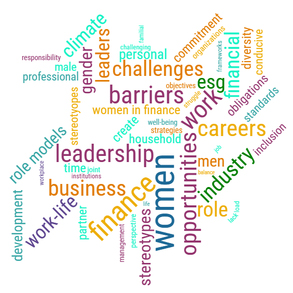How are women reshaping the finance sector, and what challenges do they face in achieving gender equality?

At the inauguration of the ESCP Women in Finance Chair on December 15, 2023, ESCP Business School held a number of workshops and a panel discussion. Almudena Canibano and Marion Festing, co-directors of the Chair, provided insightful commentary after welcoming remarks by Pramuan Bunkanwanicha, Dean of the faculty, and Veronique de la Bachelerie, treasurer of the ESCP Business School foundation, respectively. There were about 100 people in attendance at this event.
Professor in Finance and Dean of the ESCP Turin Campus Alberta Di Giuli, spoke at length about the value of having women in leadership roles in the financial sector during her keynote address.
What followed was a panel discussion with prominent figures from the industry, including Sylvie Huet from Amala Partners, Maxime Létissier from Ardian, Gennat Mouline from Eight Advisory, Antoine Desrues from Lombard Odier, Julien Bobin from Ondra and Gwenola Chambon from Vauban Infrastructure Partners. The discussion was moderated by Patricia Delon, founder of ESCP au Féminin and CEO of RATP Travel Retail.
The event then moved to a series of workshops to discuss key issues regarding the inclusion of women in finance. These were moderated by the chair co-directors and two ESCP alumna, Delphine Lajoinie, investment director at BNP Paribas, and Brigitte Geny, non-executive director and chair of the ESG committee at Cogelec.
Founding Partners Acknowledgement: Special thanks to our founding partners: Amala Partners, Ardian, Eight Advisory, Lombard Odier, Ondra, and Vauban infrastructure Partners. Their diverse expertise in investment, banking, and advisory services enriches our mission towards gender equity in finance.
Key Takeaways
- Confronting Preconceptions: Gender stereotypes are a common barrier for women, particularly when it comes to being considered for key positions in risk management and decision-making. To inspire women to stand up for themselves and reach their career goals, it is crucial to challenge these stereotypes.
- Role Models: Women, especially when young in the financial sector, do not see many strong female role models, which makes it difficult for them to see a future for themselves in leadership roles. In order to inspire and guide prospective female leaders, initiatives like mentoring programs and networking events are vital.
- Gender Inequality: The finance industry is known for its male-dominated culture and intense competition, which can make it difficult for women to get into the field. Mentoring and leadership programs tailored to women's needs are essential components of a diverse and inclusive culture.
The Work/Family narrative: The challenge that many women in the demanding financial sector have is striking a balance between their professional and personal lives. Emphasizing the importance of having supportive partners and employing flexible work habits is key for achieving this balance. - The Role of ESG Considerations in Career Choices: ESG issues are taking center stage in shaping a wide range of banking professionals' professional paths. A more inclusive environmental, social, and governance (ESG) framework that prioritizes gender diversity can help women advance in their careers and assume leadership positions.
Report
In the midst of a worldwide push for gender equality, the financial sector provides another viewpoint. Extreme inequalities persist even after twenty years of improvement, especially when it comes to positions of leadership, women are noticeably underrepresented. Even after reaching middle management positions, women in banking and other sectors with strong masculine cultures are unable to advance their careers, a phenomenon known as the "double glass ceiling" (Ryan, et al., 2016).
There is a need for dismantling the barriers of stereotypes and unequal representation, fostering work-life balance, and creating supportive ecosystems for women's growth. Drawing on the insights shared during the ESCP Chair of Women in Finance launch, we explore the many obstacles faced by women in the financial sector.
1. Navigating the Maze of Gender-Based Stereotypes
The financial sector is notoriously difficult to navigate, especially for women in professional roles, due to the prevalence of gender stereotypes. These pervasive biases, deeply embedded in the cultural fabric of the industry, greatly impede women's aspirations and capacities, particularly in regard to attaining positions of leadership.
There is a common misconception that women are not up to the task of handling high-stakes roles that need decision-making, risk management, and strategic thinking in this field. This preconception acts as a barrier, preventing women from advancing in their careers and receiving promotions. Preconceptions have far-reaching effects; for example, they discourage young women from pursuing careers in finance, which is home to some of the economy's most exciting and innovative subfields.
Hence, the task is twofold. There is an urgent requirement to remove these preconceptions and provide an environment that acknowledges and appreciates the contributions and leadership of women. However, it is equally crucial to enable women in the financial industry to defy these prejudices, assert themselves, and follow their career aspirations with confidence and determination. It is essential to overcome the complex network of gender-based assumptions in order to promote gender equality in the finance industry and fully leverage the sector's potential by embracing diversity and inclusion.
2. The lack of role models
The absence of strong female role models in the finance industry is a major problem with far-reaching effects. It affects people's professional trajectories and contributes to preserving gender inequality.
According to BCG (2019), female role models in the financial sector serve as beacons that lead and inspire the next generation of female leaders. In spite of setbacks, they prove beyond a reasonable doubt that success is within reach. However, young women have a hard time seeing a clear path to leadership in the field due to the absence of such role models, which leaves a vacuum.
At the same time, young women's confidence and career aspirations are negatively impacted by the dearth of female role models in the financial sector. Young professionals may doubt their abilities to rise through the ranks of their companies if they do not see real examples of successful female executives. Feelings of inadequacy and a lack of confidence may worsen in the absence of visible examples of achievement. Fearing they won't measure up to the male-dominated finance industry's traditional expectations of success, women may be hesitant to take on leadership roles or undertake ambitious projects.
3. Challenging the male-dominated workplace Culture
It can be difficult for women in the finance industry to feel valued and accepted due to the industry's notoriously male-dominated and cutthroat culture. Career advancement in the field may be hindered as a result of a lack of guidance and support. Women wishing to make a mark and advance in their careers face unique challenges in this long-standing and patriarchal environment.
It can be demanding for women to adjust to a work environment that does not naturally value or reflect their perspectives and experiences, which can lead to feelings of isolation for those working in finance. This sense of exclusion permeates not only personal relationships but also opportunities for advancement in one's career.
An all-encompassing and varied approach is required to overcome these cultural hurdles. Financial institutions should make concerted efforts to create a culture that welcomes and values diversity in all its forms. Creating a corporate culture that appreciates varied perspectives and leadership styles, as well as implementing mentorship programs targeted at empowering women, are all part of this effort.
One effective strategy is to establish women networks inside companies. These groups can serve as a meeting place for women to share stories, learn from one another, and forge relationships with mentors. Furthermore, women can be better prepared to succeed in a cutthroat environment by participating in leadership training programs that are designed with their unique needs in mind.
4. The work/family Narrative
In the complex and varied world of finance, striking a good work-life balance is no easy feat. Overcommitment is common in the financial sector due to the inherent pressure to deliver on ambitious commitments and surpass expectations, often at the cost of one's own well-being. There is a persistent pattern in this typically male-dominated culture where work is valued more highly than personal life. Historically, males have set a standard that disregards the fact that many women have multiple responsibilities at once, even if they are not usually the primary carers in the home.
A key strategic decision for women in the financial sector is choosing a spouse who is supportive and who shares family responsibilities. Taking on this shared duty at home might lighten your load and make it easier to go for ambitious career goals.
Attaining a healthy work-life balance in the field of finance is an intricate and diverse process. Through the implementation of strategies such as adaptable work schedules, equitable distribution of family obligations, and encouraging management, the finance sector may establish a conducive atmosphere for women to excel in their careers while maintaining their personal welfare. This transformation is not only advantageous for women but also represents a progression towards a more varied, inventive, and enduring industry.
5. The role of ESG
The significance of environmental, social, and governance (ESG) considerations in determining the professional paths taken by women in the financial sector was highlighted in the workshops. ESG frameworks often include specific targets and goals related to gender diversity. By following specific guidelines, financial institutions are required to demonstrate progress in the representation of women, particularly in leadership roles.
Companies are highly motivated to increase the number of women in their workforce and create an environment that supports their professional growth due to the strong emphasis on transparency and accountability.
It is imperative that the financial sector places a premium on creating welcoming work environments for women and enacting regulations that help them progress in their careers. Among these measures are mentorship programs, maternity and paternity leaves, and more adaptable work schedules. By incorporating these practices into their ESG targets, organizations show their dedication to creating an environment where women may thrive.
Campuses









![© Adobe Stock - Larisa [copyright] © Adobe Stock - Larisa [copyright]](/sites/default/files/styles/home_listing/public/2021-03/Gender_Avgoustaki.jpg)
